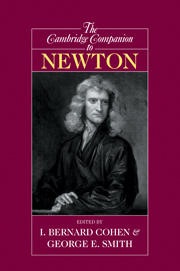Book contents
- Frontmatter
- Introduction
- 1 Newton's philosophical analysis of space and time
- 2 Newton's concepts of force and mass, with notes on the Laws of Motion
- 3 Curvature in Newton's dynamics
- 4 The methodology of the Principia
- 5 Newton's argument for universal gravitation
- 6 Newton and celestial mechanics
- 7 Newton's optics and atomism
- 8 Newton's metaphysics
- 9 Analysis and synthesis in Newton's mathematical work
- 10 Newton, active powers, and the mechanical philosophy
- 11 The background to Newton's chymistry
- 12 Newton's alchemy
- 13 Newton on prophecy and the Apocalypse
- 14 Newton and eighteenth-century Christianity
- 15 Newton versus Leibniz: from geometry to metaphysics
- 16 Newton and the Leibniz-Clarke correspondence
- Bibliography
- Index
5 - Newton's argument for universal gravitation
Published online by Cambridge University Press: 28 May 2006
- Frontmatter
- Introduction
- 1 Newton's philosophical analysis of space and time
- 2 Newton's concepts of force and mass, with notes on the Laws of Motion
- 3 Curvature in Newton's dynamics
- 4 The methodology of the Principia
- 5 Newton's argument for universal gravitation
- 6 Newton and celestial mechanics
- 7 Newton's optics and atomism
- 8 Newton's metaphysics
- 9 Analysis and synthesis in Newton's mathematical work
- 10 Newton, active powers, and the mechanical philosophy
- 11 The background to Newton's chymistry
- 12 Newton's alchemy
- 13 Newton on prophecy and the Apocalypse
- 14 Newton and eighteenth-century Christianity
- 15 Newton versus Leibniz: from geometry to metaphysics
- 16 Newton and the Leibniz-Clarke correspondence
- Bibliography
- Index
Summary
The aspect of Newton's Principia that has provoked the most controversy within the philosophy of science, other than his invocation of absolute space, time, and motion, has been his claim to have “deduced” the law of universal gravity from phenomena of orbital motion. In particular, a tradition that began with Pierre Duhem and continued with Karl Popper and then Imre Lakatos has argued that this claim is at best misleading (Duhem) and at worst a subterfuge (Lakatos). Among other reasons they have advanced against any such deduction is the objection that no deduction from consistent premises can yield a conclusion that entails one or more of these premises is false; yet one consequence of the law of universal gravity is that all the orbital phenomena from which Newton proceeds in his supposed deduction are, strictly, false. Duhem, Popper, and Lakatos insist, to the contrary, that only a hypothetico-deductive construal of Newton's evidence for universal gravity makes sense, Newton's outspoken objections to hypothetico-deductive evidence notwithstanding. More recently, Clark Glymour has offered a “bootstrapping” construal of Newton's evidence, proposing that it captures the logical force of the reasoning for universal gravitation in the Principia better than a straight-forward hypothetico-deductive construal can. Glymour too, however, sees no way around concluding that some of what Newton seems to think he is doing cannot be correct.
One issue this raises is understanding the reasoning Newton offers in arriving at the law of universal gravity and describes as a “deduction” from phenomena. Another is the extent to which such reasoning is cogent and illuminates scientific method. The simplest way to respond to these questions is to proceed step-by-step through Newton’s reasoning.
- Type
- Chapter
- Information
- The Cambridge Companion to Newton , pp. 174 - 201Publisher: Cambridge University PressPrint publication year: 2002
- 23
- Cited by



